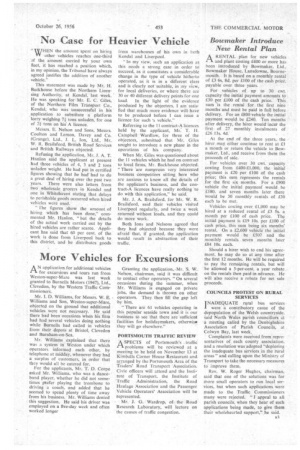No Case for Heavier Vehicle
Page 37

If you've noticed an error in this article please click here to report it so we can fix it.
" WHEN the amount spent on hiring other vehicles reaches one-third af the amount carried by your own fleet, it has reached a position which, in my opinion, the Tribunal have always agreed justifies the addition of another vehicle."
This statement was made by Mr, H. Backhouse before the Northern Licensing Authority, at Kendal, last week. ' He was speaking for Mr. E. C. Giles, of the Northern Film Transport Co., Kendal. who was unsuccessful in his _application to substitute a platform lorry weighing 71 tons unladen, for one of 24 tons on hisA licence.
Messrs. E. Nelson and Sons, Messrs. Coulton and Lemon, Davey and Co. (Grange), Ltd., 1, L. Ton, Ltd., Mr. W. R. Brailsford, British Road Services and British Railways objected.
Refusing the application, Mr. I. A. T. Hanlon said the applicant at present had three vehicles of 4, 3 and 2 tons unladen weight. He had put in certified figures showing that he had' had to do a great deal of hiring over the past two years. There were also letters from two wholesale grocers in Kendal and one in Whitehaven stating that delays to perishable goods occurred when hired vehicles were used. " the figures show the amount of hiring which has been done," commented Mr. Hanlon, "but the details of the actual work carried out by the hired vehicles are rather scarce. Applicant has said that 60 per cent, of the work is done from Liverpool hack to this district, and he distributes goods from warehouses of his own in both Kendal and Liverpool.
In my view, such an application as this needs a strong case in order to succeed, as it constitutes a considerable change in the type of vehicle hitherto' operated, as it is in a different class and is clearly not suitable, in my view, for local deliveries, or where there are 30 or 40 different delivery points for One
load. In the light of the evidence produced by the objectors, I am satisfied that much more evidence will-have to be produced before I can issue a licence for such `a vehicle."
Referring to the 11 contract-A licences held by the applicant, Mr. T. H. Campbell : Wardlaw, for three of the objectors, submitted that Mr. Giles sought to introduce a new phase in the operations of his Company.
When Mr. Giles was questioned about the 11 vehicles which he had on contract to local firms, Mr. Backhouse objected. "There are nuinFrons very interested business competitors Sitting here who are anxious to know all the details of the applicant's business, and the contract-A licences have really nothing 'to do with this application," he said.
Mr. J. A. Brailsford, for Mr. W. R. Brailsford, said their vehicles visited Liverpool regularly, and twice a week returned without loads, and they could do more work.
Both Ions and Nelsons agreed that they had objected because they were afraid that, if granted. the application would result in abstraction of their traffic.




































































































